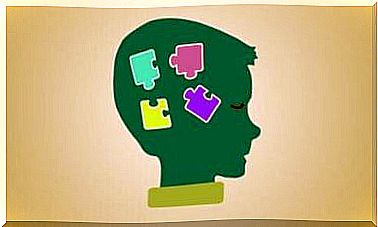The Most Frequent Cognitive Distortions In The Couple

Cognitive distortions are rigid and erroneous thought patterns that our mind resorts to during the information processing process. They select the information, the way it is processed and the results of this process, in terms of thoughts and emotions.
There are different types of cognitive distortions and, sooner or later, we all experience them throughout our life. If the distortions only occur on certain occasions, they are not a problem. If, on the other hand, they are recurrent, they generate problems at the level of interpersonal relationships, as well as psychological malaise and difficulties in terms of personal development.
Even in couples, cognitive distortions leave their mark. If thoughts related to cohabitation, love or couple discussions come to dominate, then the relationship will experience a moment of crisis. Identifying the cognitive distortions affecting information processing in the couple relationship is essential for a good quality of life and for finding happiness.
Overgeneralization: once is enough
Overgeneralization occurs when one or two isolated incidents serve to formulate global statements or rules. An example of overgeneralization is: if my boyfriend forgot to buy something I asked for, the next time I need a favor, I won’t ask him because I think he “always forgets everything I ask” .

The most important problem with overgeneralization is that it turns the person into a judge who makes judgments all the time and, automatically, makes the person judged unable to change, because “if he gets it wrong once, he will always be wrong”, so why should he act differently?
A useful strategy to overcome overgeneralization is to look for data that contradict the global rule. For example, if you think your partner forgets everything you ask him, then look for examples of situations in which he has remembered your requests instead. It is about training the ability to question oneself, to be more objective about the information on which one relies to come to a conclusion.
Extremism: the (hyper) graduated lenses that magnify everything
This distortion is observed when an experience is perceived through a filter that exaggerates certain aspects or characteristics. During the phase of falling in love in the couple, it is normal to use the filter of extremism. A small detail looks fantastic, while a small mistake is seen as a catastrophe.
Extremism is also observed when two boyfriends are not used to disagreeing or when they have their first argument. When they face a situation in which they do not arrive at a common point of view, they experience disagreement as an insurmountable situation, an obstacle to the development of the relationship.
Examples of this cognitive distortion are: I can’t stand that you disagree with me or tell me a little lie, but still, it’s terrible that you lied to me . One resource for fighting extremism is to enrich your emotional vocabulary by looking for an intermediate term for what you want to express.
Personalization: feeling at the center of the universe
This cognitive distortion precedes situations in which one person feels responsible for the mood or behavior of the other. For example, thoughts like this are common: surely he came home from work in a bad mood because I didn’t text him at noon or since I’ve been with my friends all day, he won’t talk to me when he gets home .

Personalization generates a feeling of excessive responsibility for the well-being of others. That is, a person attributes to himself the ability to control the emotions felt by his partner.
A practical exercise to combat personalization is to draw a circle and divide 100% of the responsibility for what happened among all the possible causes, giving up feeling the only one responsible for a situation or a state of mind of the other.
Negative labeling: a judgment for everything
It consists in defining the other in a negative, disparaging and global way. The negative label identifies the negative characteristics of the partner and associates them with practically all spheres of life. Some examples of negative labels are: he is selfish, he keeps watching the game while I talk to him ; she is reckless, she always talks only about herself or seems stupid, she has a hard time understanding what I am explaining to him, she is not intelligent .
The most serious problem with this cognitive distortion in the relationship is that, if not controlled, it can lead (according to the psychologist John Gottman) into one of the four horsemen of the apocalypse that anticipate the separation: contempt. Negatively qualifying the person you are in a relationship with is enhancing a negative image of them. In addition, emotional distress, anger and fights increase.
Emotional Reasoning: If I feel this way, there is a reason
Emotional reasoning leads to looking for external causes that explain certain feelings, so if we feel bad in a given situation, it means that this situation is wrong and something or someone is responsible for it.
This cognitive distortion in the couple influences the person who manifests it because he tends to make decisions only based on the emotional state. An example of emotional reasoning is: I’m sad, I feel abandoned because he hasn’t sent me a single message all day .

Deciding solely based on how we feel is not positive, because we base our decisions on something as ephemeral and changing as emotions are. The relationship needs continuity and long-term commitment and these things are not based on the emotional impulses of the moment.
To combat emotional reasoning, it is crucial to distinguish between the way we feel and the objective situation. An effort must be made to observe what is happening from the outside and not from the perspective of the emotions of the moment. Reflecting on what advice we would give to a friend in the same situation is a good exercise in psychological detachment to combat emotional reasoning.
Thought reading: a dangerous supernatural power
Mind reading prompts a person to adopt a defensive stance as a response to what the other believes is thinking. This cognitive distortion in a couple relationship leads to acting on the basis of information that is “supposed” and not on the basis of information that really exists.
Some examples of mind reading are: even though he told me he doesn’t mind staying at home, I know he’s upset or my girlfriend congratulated me on my promotion at work, but I’m sure she doesn’t think I deserve it. .
To combat this distortion, it is essential to be clear that many times we ourselves are not sure of what is happening to us, of what we feel or think. It is therefore impossible to know for sure what the other is thinking. Even if we know a person very well, it is difficult to know exactly how he feels.
A tip to combat mind reading is “ask before guessing”. Question yourself and try to understand what you know about your partner and what, instead, you are trying to guess.
If you understand better how your mind works, you will take the necessary step to go beyond its limits. If you work every day to combat cognitive distortions in your relationship, you will feel in control of your thoughts, free from prejudice and ready to fully experience your relationship.









